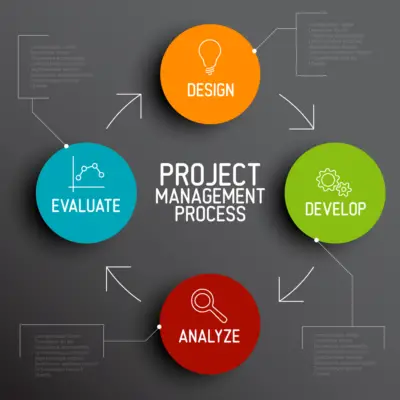Digital project managers are responsible for planning, organizing, and overseeing the execution of digital projects. They work closely with clients, stakeholders, and cross-functional teams to define project requirements, create project plans, and ensure that projects are delivered on time and within budget.
They are also responsible for managing project risks, resolving issues, and meeting project objectives. Additionally, digital project managers are typically involved in the evaluation and adoption of new technologies, as well as the development and implementation of best practices and processes to improve project delivery.
With the increasing demand for digital transformation in organizations, the role of digital project managers has become crucial in driving the successful delivery of digital initiatives.
Digital project manager jobs are a prominent position in the contemporary workforce. This article provides a comprehensive overview of the role, responsibilities, and qualifications required for individuals aspiring to become digital project managers.
This introduction sets the stage for an in-depth exploration of the field and its requirements.
Definition of Digital Project Managers
The demand for digital project managers has been increasing due to the growing complexity of digital projects and the need for effective management and coordination.
Digital project managers are crucial in overseeing the planning, execution, and delivery of digital projects, ensuring they are completed on time, within budget, and meet the desired objectives.
Their expertise in digital technologies, project management methodologies, and strong communication skills make them valuable assets for organizations aiming to navigate the digital landscape successfully.

Reasons for Hiring Digital Project Managers
One reason for hiring digital project managers is their ability to coordinate and manage complex projects in a digital environment effectively.
Digital project managers play a crucial role in overseeing the successful execution of digital projects. They possess the necessary skills and expertise to ensure that projects are delivered on time, within budget, and meet the client’s requirements.
These managers are responsible for creating project plans, allocating resources, and communicating with stakeholders. They work closely with developers and other team members to ensure that the project is progressing as planned and that the quality of deliverables is maintained.
Moreover, digital project managers have a deep understanding of project management methodologies and experience managing projects in a digital context.
Their analytical and problem-solving skills enable them to identify and address any potential issues or risks during the project lifecycle.
Job Responsibilities
Planning and defining projects, allocating resources, and managing team members and budgets are key responsibilities of digital project managers.
These tasks involve strategic thinking, effective communication, and strong organizational skills.
Ensuring quality assurance and control, and setting deadlines, and meeting goals are also important responsibilities of digital project managers. By effectively carrying out these responsibilities, digital project managers contribute to the successful execution and delivery of digital projects.
Planning and Defining Projects
A clear and well-defined project plan must be established to execute digital projects effectively. This is crucial for ensuring that the team understands the project’s objectives, scope, and timeline.
A project plan serves as a roadmap, guiding the team through each project phase and helping them stay on track.
It also helps identify the necessary resources, skill requirements, and potential risks. Digital project managers are crucial in creating and managing these project plans.
They collaborate with designers, digital marketers, and other professionals to develop comprehensive plans that align with the project goals and industry standards.
Allocating Resources
The allocation of resources is an essential aspect of project management as it ensures that the necessary materials, personnel, and funding are available to support the successful execution of digital projects.
Digital managers play a crucial role in overseeing the allocation of resources effectively. They collaborate with cross-functional teams to determine the specific requirements of each project and identify the resources needed to achieve project goals.
This process involves assessing the availability and suitability of personnel, materials, and funding sources. Project managers must also consider factors such as compensation, job type, and project management software and tools availability.
Managing Team Members and Budgets
In the context of digital project management, effective management of team members and budgets is crucial. This involves addressing resource allocation, production timelines, and budget constraints.
The manager must oversee the team’s work, ensuring tasks are completed on time and within budget. They must also possess strong organizational skills to coordinate the efforts of team members and allocate resources efficiently.
In addition, the project manager should have a deep understanding of content management systems and content creation tools to facilitate smooth workflow and collaboration.
Furthermore, they should possess the ability to develop and execute a comprehensive content strategy.
Strong communication skills are essential for managing remote teams and ensuring effective collaboration. Moreover, copywriting experience and broad skill sets are advantageous for optimizing team performance and success.
Ensuring Quality Assurance and Control
Effective quality assurance and control measures are necessary to ensure the successful execution of digital projects. In digital project management, quality assurance ensures that the final deliverables meet the required standards and specifications.
This involves conducting thorough testing and reviews of digital content, such as websites or mobile applications, to ensure their functionality, usability, and user experience.
Content management platforms like WordPress or Drupal are often utilized to streamline content creation and management processes.
Digital project managers must possess strong content creation knowledge and proficiency in using tools like Google Analytics and Adobe Creative Cloud.
The job requirements for digital project managers often include expertise in quality assurance methodologies and project management roles, and a competitive salary is offered to attract and retain top talent in this field.
Setting Deadlines and Meeting Goals
Setting deadlines and meeting goals requires careful planning and coordination to ensure timely completion of tasks and alignment with project objectives.
In digital project manager jobs, setting deadlines and meeting goals is a crucial aspect of the role. Digital managers oversee the successful execution of digital projects within a digital project management unit.
They apply project management principles to ensure that projects are delivered on time and within budget.
To be effective in this role, digital project managers must possess strong verbal communication skills and presentation skills to communicate with stakeholders and the marketing team effectively.
During the interview process, employers often look for candidates who have demonstrated their ability to set deadlines and meet goals in previous roles, as these are in-demand skills in digital project management.
Reporting to Stakeholders
Digital project manager jobs require effective communication and collaboration with various stakeholders involved in a project.
One crucial aspect of this role is reporting to stakeholders, which involves regular updates on project progress, milestones, and potential challenges.
Reporting to stakeholders keeps project managers informed and engaged throughout the project lifecycle. Effective reporting involves clear and concise communication, highlighting key metrics, risks, and mitigation strategies.
It also includes presenting data and insights in a format easily understandable for stakeholders, such as reports or presentations.
Additionally, project managers must tailor their communication style and level of detail to suit different stakeholders, ensuring that the information provided aligns with their needs and expectations.
Reporting to stakeholders is essential for digital project managers to maintain transparency and foster successful project outcomes.
Monitoring the Progress of Projects
Monitoring the progress of projects involves regularly tracking and evaluating the development, milestones, and potential obstacles encountered during the project lifecycle.
In digital project manager jobs, monitoring project progress is crucial for successful project delivery. This entails keeping a close eye on project status, tracking project updates, and ensuring project milestones are met.
Additionally, project monitoring involves evaluating the project’s adherence to budget constraints and implementing effective budget management strategies.
By closely monitoring project progress, digital project managers can identify any potential issues or delays and take appropriate action to mitigate them.
Furthermore, project evaluation plays a vital role in assessing the overall success of a project and identifying areas for improvement.
Monitoring the progress of projects is a critical responsibility for digital project managers to ensure the successful completion of projects within the defined scope, time, and budget.
Evaluating the Performance of Team Members
Evaluating the performance of team members involves assessing their contributions, skills, and effectiveness in achieving project objectives. In digital project manager jobs, evaluating team members is crucial for successful project delivery.
Digital project managers are responsible for overseeing content management and digital production, ensuring the quality of jobs posted and resolving any technical issues that may arise.
Project managers can identify strengths and weaknesses by evaluating team members and making informed decisions about resource allocation and training needs.
This evaluation process aligns with organisations’ annual and long-range business plans, enabling project managers to develop a bulletproof plan for achieving project objectives.
Additionally, evaluating team members’ performance helps optimise the cloud infrastructure and video production processes, ensuring efficient project execution.

Qualifications and Skills Required for Digital Project Manager Jobs
This will focus on the essential qualifications and key skills required for digital project manager (DPM) jobs.
DPMs must possess a combination of educational background and professional experience in relevant fields such as project management, marketing, or technology.
In addition to qualifications, DPMs are expected to have strong communication and leadership skills and a solid understanding of digital platforms and tools.
Essential Qualifications for Dpms
One of the key factors in determining the suitability of candidates for digital project manager jobs is the possession of essential qualifications.
These qualifications are necessary to ensure the project manager meets client expectations and industry standards.
Essential qualifications include a strong understanding of digital content and the ability to develop and implement market strategies.
Additionally, project managers must possess transferrable skills such as effective communication, problem-solving, and leadership abilities. They must also be knowledgeable in budget concerns and have a solid understanding of risk management protocols.
During the screening process, candidates are assessed based on their possession of these essential qualifications, as they are crucial for the successful execution of digital project manager jobs.
Key Skills for Dpms
Effective execution of digital project management requires individuals to possess a comprehensive set of key skills. These skills encompass strategic planning, problem-solving, effective communication, leadership, budget management, and risk mitigation.
Digital project managers (DPMs) are crucial in overseeing and coordinating various aspects of digital projects. They collaborate with cross-functional teams, ensuring project objectives are met within specified timeframes and budgets.
DPMs must excel in content marketing, as they are responsible for creating and implementing digital strategies to maximize audience engagement and conversion rates.
Additionally, a strong understanding of digital agency operations, product management, and graphic design is essential for effective project delivery.
DPMs can search for job opportunities on dedicated job boards. Their career journey can be mapped by tracking their career history and acquiring the necessary skills and qualifications for advancement in the field.
Frequently Asked Questions
What Are the Common Challenges Faced by Digital Project Managers?
Common challenges faced by digital project managers include managing multiple stakeholders, coordinating diverse teams, adhering to tight deadlines, dealing with changing requirements, ensuring effective communication, and balancing budget constraints.
How Can Digital Project Managers Effectively Manage Remote Teams?
Effectively managing remote teams is a challenge faced by digital project managers. Clear communication, goal setting, regular check-ins, and leveraging technology can help overcome this challenge and ensure successful project delivery.
What Are Some Key Strategies for Successful Stakeholder Communication in Digital Project Management?
Key strategies for successful stakeholder communication in digital project management involve clear and frequent communication, active listening, and establishing shared goals. Effective communication ensures stakeholders are informed and engaged throughout the project, facilitating successful outcomes.
How Do Digital Project Managers Ensure the Successful Delivery of Projects Within Tight Deadlines?
Digital project managers ensure the successful delivery of projects within tight deadlines through effective planning, resource allocation, and task prioritization.
They also manage risks, monitor progress, and collaborate with team members to maintain project momentum and meet deadlines.
What Are the Emerging Trends and Technologies Digital Project Managers Need to Stay Updated On?
Digital project managers must stay updated on emerging trends and technologies to ensure effective project management. This allows them to adapt strategies, leverage new tools, and optimize project delivery within the evolving digital landscape.

Conclusion
Digital Project Managers oversee and manage various digital projects within an organization. They are responsible for planning, executing, and monitoring these projects to ensure successful completion.
These professionals possess technical expertise, project management skills, and effective communication abilities. They must have strong organizational skills, problem-solving capabilities, and the ability to work well under pressure.
Digital Project Manager jobs require individuals with a diverse skill set and a strong understanding of digital technologies and project management principles.

Chris Ekai is a Risk Management expert with over 10 years of experience in the field. He has a Master’s(MSc) degree in Risk Management from University of Portsmouth and is a CPA and Finance professional. He currently works as a Content Manager at Risk Publishing, writing about Enterprise Risk Management, Business Continuity Management and Project Management.

